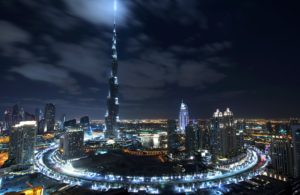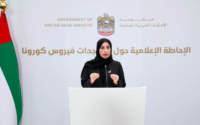Real Estate Contribution To Dubai’s GDP Reached 7.2 Percent In 2019: DLD
Dubai’s real estate sector represents one of the main economic sectors in economic growth, and it actively contributes to the growth of its economy.
Over the past years, the emirate has achieved record rates of economic growth driven by the economic initiatives and packages that the Dubai Government is undertaking to raise economic growth and stimulate various economic sectors, according to the annual “Real Estate Sector Performance 2020” report issued by the Dubai Land Department, DLD, today.
Relaesed on the side-lines of the International Property Show and Invest in Dubai Real Estate, the report provides a comprehensive tool for customers in the sector, allowing them to familiarise themselves with the most important results achieved, affirming DLD’s efforts to achieve its vision to position Dubai as the world’s premier real estate destination and a byword for innovation, trust, and happiness.
The report aims to provide a comprehensive picture of Dubai’s real estate sector’s performance by analysing all aspects of the sector’s performance and the various economic and operational indicators that affect its performance to determine its future trends.
The value of Dubai’s GDP reached AED407 billion in 2019 as compared to AED389 billion in 2018, with a growth rate of 2.2 percent. But the emergence of COVID-19 in December 2019, and its subsequent outbreak around the world, led to a decline in global economic growth rates, prompting all international institutions to reduce their global growth forecasts for 2020. To avoid the consequences of the pandemic, Dubai provided a package of measures and economic incentives to ensure business continuity and help the various economic sectors overcome the pandemic, most importantly the launch of an economic stimulus package to support companies and the business sector in Dubai to boost financial liquidity, among others, the report noted.
The contribution of the real estate sector to Dubai’s GDP reached 7.2 percent in 2019, and the sector achieved an added value of more than AED29.4 billion, with a growth rate of 3.3 percent compared to 2018. Real estate transactions achieved remarkable growth in 2019 in terms of the number and value of real estate transactions, and this improvement continued during the first months of 2020. The growth rate achieved in the number of real estate transactions reached eight percent in 2019 with over 57,000 real estate transactions, compared to over 52,000 real estate transactions in 2018.
The value of real estate transactions reached approximately AED226 billion in 2019, compared to AED221 billion in 2018, with a growth rate of 2.1 percent. This improvement in the value of real estate transactions is due to the remarkable growth in the value of both sales and mortgages, where the value of sales reached AED81 billion in 2019, compared to AED77 billion in 2018, with a growth rate of approximately five percent, and the value of real estate mortgages reached AED125 billion in 2019 compared to AED120 billion in 2018, with a growth rate of approximately four percent.
In addition, the number of real estate investments in 2019 exceeded 47,000 investments, with a growth rate of 18 percent compared to 2018, which achieved 40,000 real estate investments. The number of real estate investors also witnessed remarkable growth during 2019 compared to previous years.
The number of real estate investors in 2019 exceeded 34,000 real estate investors, compared to 2018 with 29,846 investors, with a growth rate of 14 percent.
Dubai Marina ranked first in terms of real estate investment quantity in 2019 with 3,920 investments, followed by Business Bay with 3,508 investments, Al Khairan First with 3,142 investments, Hadaeq Sheikh Mohammed Bin Rashid with 2,833 investments, and Burj Khalifa with 2,721 investments.
Investors from India topped the list in terms of nationalities with 5,426, followed by the UAE with 5,172, and the KSA, China, and the UK with 2,198, 2,096 and 2,088 respectively, followed by Pakistan, Egypt, Jordan, the US, and Canada.
In terms of real estate projects, a total of 1,894 projects were registered with DLD in freehold areas, 814 of which were completed and 314 under construction. In 2019, 70 real estate projects were registered with DLD, while 14 were registered in H1 2020. Of the projects registered in 2019, 69 percent were buildings, 24 percent were villa complexes, and seven percent were villas.
As for the completed projects according to the year of project completion, 78 projects registered with DLD were completed in 2019 in freehold areas compared to 63 projects in 2018.
Besides, 314 projects registered with DLD are still under construction up until H1 2020. According to the date of project registration, 53 projects were registered in 2019, compared to 61 in 2018, 75 in 2017, and 45 in 2016.
As for Ejari contracts, 469,310 effective contracts were registered in 2019 according to the date of contract registration, compared to 448,564 in 2018, with a growth of five percent.
An analysis of the performance of subsectors in the real estate sector showed that over 17,000 housing units were added to the real estate sector in 2019 varying between units, villas, complexes, buildings and residential lands with a total area of approximately four million square metres, compared to 10,996 residential properties in 2018 from the completed projects according to the end date of the project with a total area of approximately one million square metres.
2019 hit a record-high in terms of number and area of residential properties that have been added to the real estate sector, which is expected as a result of Dubai’s preparations to cover the expected increase in demand during Expo 2020 before it was postponed to 2021 due to the unforeseen circumstances imposed by COVID-19.
2019 also witnessed the addition of 871 new commercial establishments to the real estate market with a total area of 243,529 square metres, which is higher than the past few years that witnessed an average addition of 250 shops annually. 2018 witnessed the addition of 238 commercial establishments according to the date of completion of the project with a total area of 39,262 square metres.
As for the hotel sector, there was a total of 544 hotels in Dubai in 2019 compared to 519 hotels in 2018, with a growth rate of approximately five percent according to the data of the Dubai Statistics Center. This growth was also reflected in the number of hotel rooms in 2019, with approximately 100,744 hotel rooms, compared to 91,085 hotel rooms in 2018, with a growth rate of approximately 11 percent.
The economic impact of COVID-19 will extend to the real estate sector in most countries of the world, but thanks to the proactive measures by the government, digital transformation and technological progress to provide all government and private services, they have greatly reduced the severity of the expected impact of the pandemic on Dubai’s real estate sector. The government contributed to the promotion and support of various economic activities in Dubai, greatly assisting in the speedy recovery and resumption of normal economic activity. Also, several measures were taken and packages of initiatives were launched to limit the effects of the outbreak COVID-19.






